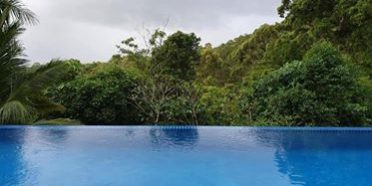Looking at building a swimming pool but a bit lost with all the type of sanitation available?
Don’t worry, as a trusted Sunshine Coast pool builder, we are here to help you in making your decision.
Gone are the times where swimming pools strongly smelled like chlorine and were making your skin and hair extremely dry. In 2020 less harmful solutions are available to replace the old chlorine system. In this article we will go trough all the pros and cons of the 3 main sanitation systems:
Salt water system
How does it work:
Firstly, It’s important to note that salt chlorinators do not create a chlorine-free pool. They use dissolved salt to create chlorine to clean the pool. Salt chlorination uses an electrolysis process to produce chlorine from common salt (sodium chloride) which has been added to the pool or spa water in a measured amount. The chlorine gas produced by this process is soluble in water, and so dissolves instantly to form Hypochlorous Acid which is the sanitiser used to sterilise the pool or spa water. Recent developments within the spa industry have lead to the introduction of salt water brominators as an additional option for spa water disinfection.
Pros of the salt water pools:
– Maintenance: A salt water pool is easy to maintain and cost effective.
– Smell: even thought this type of filtration transform salt into chlorine, it doesn’t have the strong chlorine smell we used to have with the old swimming pool systems.
– Effect: you won’t have the same harsh effect as we used to have with the old chlorine pools. Your hair won’t turn green and your swimsuits won’t bleach. Your skin will also less suffer.
Cons of the salt water pools:
– As mentioned above, this type of filtration is not chlorine free. Although it is less harsh than traditional chlorine pools, people with extra sensitive skins and eyes may want to look at another option for they swimming pool.
Magnesium system
How does it work:
Also known as mineral pools, magnesium pools are swimming pools that have added minerals in the pool water. Using the same filtration system as the salt water one, magnesium Chloride flows through the cell and is converted by electrolysis to Magnesium Hydroxide which acts as a flocculent.
Pros of the magnesium pool:
– Smoother again than the salt water, it is definitely a better choice for people with sensitive skins and eyes.
– Silk water effect on you skin
– Many believe that magnesium can have positive effects on your health
– Less chlorine than the salt water
Cons of the magnesium pool:
– A little more expensive than the salt water
– A small amount of chlorine is still used
Enviroswim system
How does it work:
The Enviroswim ES-3 is a revolutionary breakthrough in swimming pool technology that sanitises water without adding chemicals, except for pH balancing requirements. Using a powerful combination of silver and copper electrodes, ionization and ultrasonics, the system removes all the “nasties” from your pool and leaves you with pure, clean water. Copper is an algaecide. Silver is an anti-bacterial agent. But they don’t have oxidizing properties. If you try to run a pool just on copper and silver, you don’t have anything to break down the organic compounds. So what we use for the oxidization part of the process is a combination of electronic oxidisation and ultrasonics.
Pros of the Enviroswim system:
– Zero chlorine
– No irritation to skin and eyes
– Environmentally friendly
Cons of the Enviroswim system:
– More expensive than the salt and magnesium system
For more info on the Enviroswim system visit their website: https://www.enviroswim.com/
We hope we helped you understand a bit more the difference between the 3 main sanitation systems available.
If you have more questions do not hesitate to keep in touch with us by following this link: https://serenitypoolco.com.au/contact/





